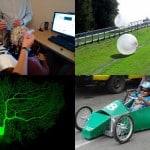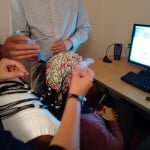Guest Post by Michelle Voss, University of Iowa We all know that exercise is good for us And this past holiday season, the market was awash with activity monitors like the FitBit and Nike Fuel Band to help you reach your fitness goals from the neck down. But what about from the neck up? Although […]
Judging Beauty in Places, Faces
Seeing the new photos of the Pillars of Creation from the Hubble Telescope took my breath away. Beautiful and awe-inspiring. But what was happening in my brain when I looked at them? How and why we react to beauty is something we rarely think about, but neuroscientists are making progress in better understanding these processes. […]
A Year in Cognitive Neuroscience: 10 Stories from 2014
Our round-up of some of the top CNS blog posts of the year, featuring a range of cognitive neuroscience, from new research on memory, learning, and language, to the importance of neuroscientists using Twitter. 1. If the CIA Tweets, Cognitive Neuroscientists Can Too: Harnessing Twitter’s Power for Your Research Micah Allen (@neuroconscience) talks about why […]
Lessen Anticipated Pain With Your Imagination
Imagination is not just something for creative endeavors — it is a real-world tool that can not only shape the way we act in the future, but also affect how we feel right now. Think about the dread you feel the day before a tooth extraction, imagining the pain to come. New research finds that you […]
fNIRS: The In-Between for Brain Activity in Real-World Settings
Guest Post by Nick Wan, Utah State University Imagine driving in a simulator while undergoing an fMRI. No, you won’t be lying down — this is not your typical large, chamber-like scanner. An instrument called functional near-infrared spectroscopy, or fNIRS, is using a smaller, more portable design to record brain activity in more real-world settings. “It’s really that […]
Getting Past Dyslexia Myths: How Neuroscience Has Helped
Guest Post by Priya Kalra, Harvard University Although scientists now understand dyslexia better than ever before, it is still a condition shrouded in myth and misunderstanding. I first came to see our flawed perceptions of dyslexia while tutoring a 4th grader. Despite normal intelligence and effort, he could not read. I saw how the frustration this caused […]
Smell Stimulates Early Visual Processing in Women But Not in Men
Smells are undeniably powerful, able to transport us to different places and times in our memories. Think of how you feel when you smell cookies baking in the oven. But can they also change how we see things? New research shows that smells can enhance visual processing – but only in women, not men. “The […]
5 Things You Didn’t Know About EEG Studies
“Think of it as a weird massage…” Journal articles can often feel impersonal to the readers. The participants are nameless subjects, the equipment and the meticulous lab set-up overshadowed by the findings. But as I learned firsthand, such studies are anything but impersonal. I recently participated in an electroencephalogram (EEG) study in the lab of […]
How Do Children Learn to Read? Structural Changes in the Brain
Ka-Ka-Ka-r-r-r-et-et-et: Carrot. For parents helping their children learn to read, sounding out words like that is a daily occurrence. Letter-by-letter, syllable-by-syllable, kids make the sounds before thinking about the meaning of the words. As they become reading proficient, they can recognize the words without this painstaking process. The path that children take to reading proficiency […]
Exercise Adapts the Aging Brain for Cognitive Health
Scientists are still trying to figure out exactly why exercise promotes cognitive health, especially in older adults. Some researchers posit that physical activity helps maintain youthful brain structures, but a new study instead suggests exercise changes the way seniors’ brains process information – making the aging brain more adaptable. Understanding how this adaptation occurs can […]










